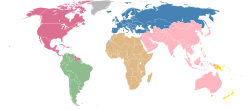FIFA Disciplinary Code
The FIFA Disciplinary Code (FDC) is a set of codes and regulations promulgated by FIFA's judicial bodies which are composed by its "Disciplinary Committee" and its "Appeal Committee".[1]
The FDC regulates almost all issues related to doping, corruption, arbitration, racism, stadium bans, etc... It also details the code of conduct of football's world governing body.
Normative Pluralism and Sporting Integrity: Sport can be considered a uniform and unitary concept, according to official documents like the Word Anti-Doping Code (WADC). The homogenous perception of a particular sport (referred to as "a sport" or "the sport") endures even in cases where different sports have distinct characteristics. The goal of national, international, and WADC sports associations is to preserve the essence of the sport. The relationship between legal procedures and athletic integrity plays a crucial role in this image. According to the Abanazir (2024) “sport is diverse from a legal standpoint because of its systems of regulation, adjudication, governance, and enforcement”(. Sports federations and leagues are examples of national and international organizations with distinct normative orders. Disparities in maintaining athletic integrity result from these normative orders. A plural normative environment is inherent in sport; thus, we need to deal with it. The article will conclude that although harmonizing norms and interpretations related to sporting integrity through national and global institutions may be acceptable, these must be achieved by promoting good governance and human rights.[2]
Recent amendments to the Disciplinary Code: FIFA have published new versions of its Disciplinary Code and Code of Ethics, which update football’s rules and provide greater protection for victims of discrimination, sexual abuse, and harassment. According to INSIDE FIFA (2023),“FIFA has updated these two sets of regulations, bringing them to the next level so as to provide the football family with additional strong tools to protect football and its integrity." These changes have been made with the help of important groups, such as the International Association of Football Lawyers, and aim to provide better tools to keep football safe and fair. Key changes include ensuring that all forms of sexual abuse, harassment, and exploitation can be prosecuted at any time, without time limits, and recognizing victims as parties to the legal process to give them full rights. Member associations and confederations are now required to inform FIFA of any decisions regarding sexual abuse and match-fixing cases.[3]
Developing a roadmap for implementing the World Anti-Doping Code: The 2013 consensus meeting in Zurich focused on creating a roadmap for the 2015 World Anti-Doping Code, highlighting the need for evidence-based and sport-specific approaches to deter doping. The anti-doping movement, which began with the IOC in the 1960s and was furthered by WADA in 1999, is poised to advance by implementing the 2015 Code and new scientific advancements. According to (Dvorak, 2014)"The overall strategy in the fight against doping must be based on good scientific evidence, statistical analysis reflecting the prevalence of doping cases and the monitoring of illicit substances." So effective anti-doping strategies require sport-specific risk assessments and regular updates based on scientific evidence. Measuring doping prevalence through epidemiological tools and biomarkers is crucial for understanding and addressing the problem. Transparency and cooperation among all stakeholders are essential to protect the integrity of sport and support clean athletes.[4]
Racism in Sports: Racism and racial discrimination are still one of the big issues in all sports, especially in football or soccer. Many soccer players suffer from racism and racial discrimination from fans. For example, the Brazilian player Vinicius Junior was subjected to racist insults and curses and called a monkey by the opposing team in the Spanish League, which caused a huge uproar among everyone, which led to sympathy and support from many players and journalists. Wondering about FIFA’s laws that criminalize racism in stadiums, which stipulate According to Castellana et al. (2023), “The FIFA Disciplinary Code 2019 edition, Art. 13, established that “Any person who offends the dignity or integrity of a country, a person or a group of people through contemptuous, discriminatory or derogatory words or actions (by any means whatsoever) on account of race, skin color, ethnic, national or social origin, gender, disability, sexual orientation, language, religion, political opinion, wealth, birth or any other status or any other reason, shall be sanctioned with a suspension lasting at least ten matches or a specific period, or any other appropriate disciplinary measure.” Despite the existence of these strict laws that criminalize racial discrimination and racist insults and set harsh penalties for those who commit these acts, Black and Latino players continue to suffer from manifestations of racism in European stadiums. Although these laws aim to combat discrimination and provide a fair and safe sporting environment for all players regardless of their ethnic or cultural backgrounds, these laws have not been entirely successful in eliminating racism in sports.[5]
Committees
[edit]The FDC decisions and regulations engages the following FIFA committees:
- Player Status Committee
- Disciplinary Committee
- Appeal Committee
- Court of Arbitration for Sport
See also
[edit]References
[edit]- ^ "FIFA Disciplinary Code" (PDF). Archived from the original (PDF) on 2017-10-13.
Castellana, G. B. , Filho, G. B. , Heuss, S. & Schneeberger, A. R. (2023). Do we need more scientific evidence for banning racist insults from soccer stadiums?. Sports Psychiatry: Journal of Sports and Exercise Psychiatry, 2 (3), 81-82. doi: 10.1024/2674-0052/a000052. Cem Abanazir. “Normative Pluralism and Sporting Integrity.” Sport, Ethics and Philosophy, 24 Mar. 2024, pp. 1–18, https://doi.org/10.1080/17511321.2024.2332577. Dvorak, J. (2015). Time for change: a roadmap to guide the implementation of the World Anti-Doping Code 2015. Bmj.com. https://bjsm.bmj.com/content/48/10/801 New editions of FIFA Disciplinary Code and Code of Ethics to enhance protection of football integrity. (2023). Fifaclearinghouse.org. https://fifaclearinghouse.org/legal/media-releases/new-editions-of-fifa-disciplinary-code-and-code-of-ethics
External links
[edit]


 French
French Deutsch
Deutsch
